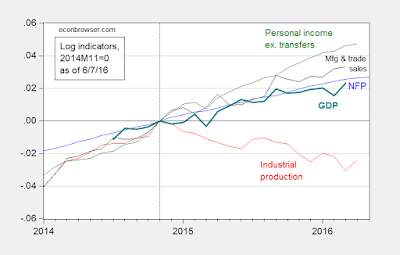Recession Watch (Econbrowser)
It's Not Just Millenials Who Aren't Buying Homes (Macroblog)
While most series are still rising, as of latest reported observations, the decline in industrial production is worrisome. (Employment is rising, but as Justin Fox points out, principal component measure of the labor market has been declining for a while).
It's Not Just Millenials Who Aren't Buying Homes (Macroblog)
In recent years, much attention has been focused on the growing tendency of millennials to rent. Theories for the decrease in homeownership among young adults abound. They include rising student debt levels that crowd out additional borrowing, a tendency to live in more urban areas where the cost to buy is relatively high, a generally tougher credit environment, and even shifts in the perception of homeownership in the wake of the housing bust. The ideas have been widely debated, and yet no single factor seems to neatly explain the declining share of the millennial population opting to buy a house. (See this webcast by the Atlanta Fed's Center for Real Estate Analytics for a discussion of these issues.)
To the extent that these factors are true, they may be affecting the decisions of other generations as well. Chart 1 below shows the overall average homeownership rate and homeownership rates by age group from 1982 to 2015. It's clear that homeownership rates have declined for everyone during the past 10 years, not just for millennials.
Chart From the Report
New and Existing Home Sales At Base 100 For the Last Three Years
Daily Chart of the Homebuilders ETF
Job Openings
Job openings were little changed at 5.8 million in April. The job openings rate was 3.9 percent. The number of job openings was little changed in April for total private and for government. Job openings increased in a number of industries, with the largest changes occurring in wholesale trade (+65,000), transportation, warehousing, and utilities (+58,000), durable goods manufacturing (+46,000), and real estate and rental and leasing (+41,000). Job openings decreased in professional and business services (-274,000). The number of job openings was little changed in all four regions. (See table 1.)
Hires
The number of hires edged down to 5.1 million in April. The hires rate was 3.5 percent. The number of hires was little changed in April for total private and edged down for government (-31,000). Hires were little changed in all industries in April and decreased in the Midwest region. (See table 2.)
Longer Term Chart of Total Hires and Openings





